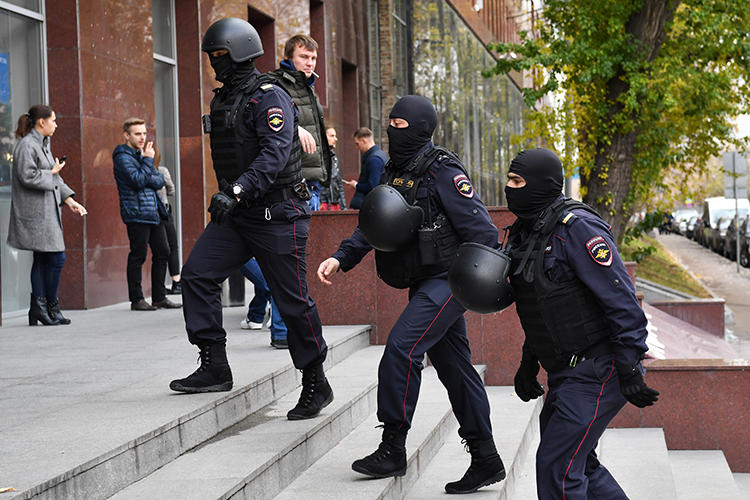Vilnius, October 18, 2019 – Russian authorities should stop harassing media outlets and reporters, and allow the press to freely cover opposition political groups, the Committee to Protect Journalists said today.
On October 15, police in Vladimir, Arkhangelsk, Smolensk, and Yoshkar-Ola raided newsroom offices and journalists’ apartments, according to international media reports and articles by local outlets. Police seized equipment and interrogated journalists in a crackdown on outlets perceived to be sympathetic to opposition political figure Aleksei Navalny, according to those reports and journalists who spoke with CPJ. The raids followed a crackdown on Navalny’s supporters this summer, and another raid in September on a journalist who covered the opposition figure, as CPJ reported at the time.
“Raiding newsrooms, interrogating journalists, and seizing equipment are clear attempt to silence independent outlets as retribution for their coverage of the Kremlin’s critics,” said Gulnoza Said, CPJ’s Europe and Central Asia program coordinator, in New York. “These practices must stop, and the media should be allowed to report on issues of public importance.”
Ten plainclothes police officers raided the offices of Vladimir-based independent news site Dovod, confiscated equipment, and interrogated staffers, according to the outlet’s editor-in-chief, Kirill Ishutin, and correspondent Aleksandr Murin, both of whom spoke to CPJ over the phone.
Murin told CPJ that the officers were already in the outlet’s office when he arrived at work, and said they did not introduce themselves but said they were conducting searches of the premises.
The officers took Murin to the local branch of the Investigative Committee, where he said agents interrogated him for four hours about the activities of Navalny’s Anti-Corruption Foundation in the region. Ishutin and Murin both told CPJ that they had reported on Navalny’s visit to Vladimir in 2018, and covered protests related to this summer’s elections, but were not affiliated with Navalny or his organization.
Police also interrogated Dovod correspondent Tatyana Mikhailova, and searched the apartments of Ishutin and Dovod deputy editor-in-chief Ilya Kosygin, according to Murin and Ishutin.
Murin added that the officers confiscated SIM cards, laptops, bank cards, hard drives, documents, money, and office and personal phones from the outlet’s journalists. Murin said the devices have not been returned, and police did not leave any written record of what they had taken.
Dovod said in a statement that it believed the searches were made to destroy the outlet by leaving it without equipment.
In Smolensk, police raided the apartment of Aleksey Volkov, chief editor of independent news website Keytown.me, according to media reports. The outlet had also reported on Navalny.
Police told Volkov’s wife that they “would take their children to the Investigative Committee” if she refused to sign a non-disclosure agreement about what was she asked by the police, according to a report by the outlet.
In Arkhangelsk, police searched the offices of independent news site 29.ru, according to a report by the outlet. The outlet said police investigators searched books and computers at the home of 29.ru correspondent Yaroslav Varenik, and interrogated him about his alleged connections to Navalny.
In Yoshkar-Ola, police raided the apartment of local blogger Aleksey Seregin, according to reports. Police confiscated Seregin’s computer, hard drive, and phone, and made him sign a non-disclosure agreement, according to those reports. Seregin previously covered Navalny’s work and gave a speech at the local headquarters of the Anti-Corruption Foundation, but told police he was not otherwise affiliated with him, according to news reports.
CPJ emailed requests for comment to the Moscow and Vladimir branches of the Investigative Committee, but did not receive any replies. The Investigative Committee posted a statement on its website on October 15 that said it conducted searches in 30 regions as part of a “preliminary investigation.”
